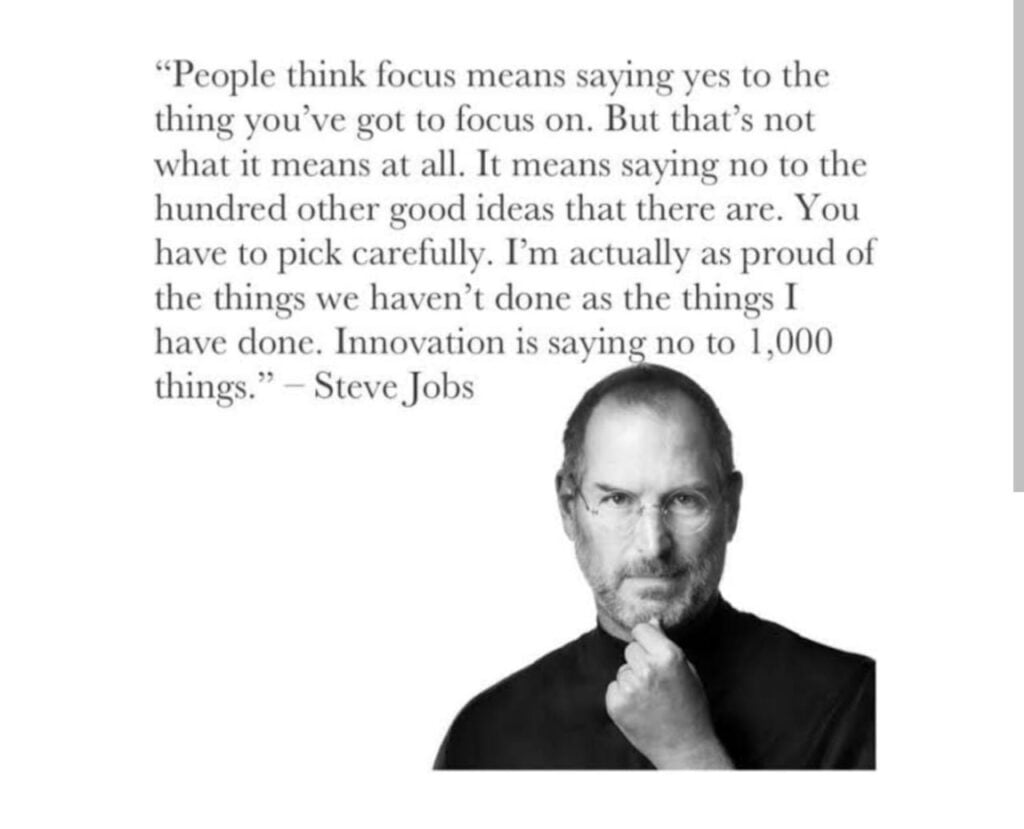2nd July 2024
Steve Jobs was once asked, what he thought was his most important creation, most thought, he would answer the iPad or the Mac.
Instead, he said it was Apple the company.
Making an enduring company, he said, was both far harder and more important than making a great product.
How did he do it? Business schools will be studying that question a century from now, but one of the keys to his success was Focus.
When Jobs returned to Apple in 1997, it was producing a random array of computers and peripherals, including a dozen different versions of the Macintosh.
After a few weeks of product review sessions, he’d finally had enough. “Stop!” he shouted. “This is crazy.”
He grabbed a Magic Marker, padded in his bare feet to a whiteboard, and drew a two-by-two grid.
“Here’s what we need,” he declared. Atop the two columns, he wrote “Consumer” and “Pro.” He labeled the two rows “Desktop” and “Portable.”
Their job, he told his team members, was to focus on four great products, one for each quadrant. All other products should be canceled. There was a stunned silence.
But by getting Apple to focus on making just four computers, he saved the company. “Deciding what not to do is more important.”
After he righted the company, Jobs began taking his “top 100” people on a retreat each year.
On the last day, he would stand in front of a whiteboard (he loved whiteboards, because they gave him complete control of a situation and they engendered focus) and ask, “What are the 10 things we should be doing next?”
People would fight to get their suggestions on the list. Jobs would write them down—and then cross off the ones he decreed dumb.
After much jockeying, the group would come up with a list of 10. Then Jobs would slash the bottom seven and announce, “We can only do three.”
Focus was ingrained in Jobs’s personality and had been honed by his Zen training.
He relentlessly filtered out what he considered distractions.
Colleagues and family members would at times be exasperated as they tried to get him to deal with issues—a legal problem, a medical diagnosis—they considered important. But he would give a cold stare and refuse to shift his laser like focus until he was ready.
Near the end of his life, Jobs was visited at home by Larry Page, who was about to resume control of Google, the company he had co-founded.
Even though their companies were feuding, Jobs was willing to give some advice. “The main thing I stressed was focus,” he recalled. Figure out what Google wants to be when it grows up, he told Page. “It’s now all over the map. What are the five products you want to focus on? Get rid of the rest, because they’re dragging you down. They’re turning you into Microsoft. They’re causing you to turn out products that are adequate but not great.”
Page followed the advice. In January 2012 he told employees to focus on just a few priorities, such as Android and Google+, and to make them “beautiful,” the way Jobs would have done.
Focus, like Jobs, to succeed & stay blessed forever.

